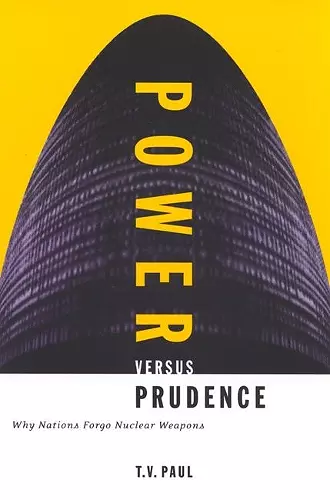Power versus Prudence
Why Nations Forgo Nuclear Weapons
Format:Hardback
Publisher:McGill-Queen's University Press
Currently unavailable, our supplier has not provided us a restock date

An examination of the reasons technologically capable or near capable states have forgone the option of building deliverable nuclear weapons.
While most existing works on nuclear proliferation deal with the question of nuclear acquisition, the author explains why some states have decided to forswear nuclear weapons even when they have the technological capability or potential capability to develop them, and why some states already in possession of nuclear arms choose to dismantle them.In Power versus Prudence Paul develops a prudential-realist model, arguing that a nation's national nuclear choices depend on specific regional security contexts: the non-great power states most likely to forgo nuclear weapons are those in zones of low and moderate conflict, while nations likely to acquire such capability tend to be in zones of high conflict and engaged in protracted conflicts and enduring rivalries. He demonstrates that the choice to forbear acquiring nuclear weapons is also a function of the extent of security interdependence that states experience with other states, both allies and adversaries. He applies the comparative case study method to pairs of states with similar characteristics - Germany/Japan, Canada/Australia, Sweden/Switzerland, Argentina/Brazil - in addition to analysing the nuclear choices of South Africa, Ukraine, South Korea, India, Pakistan, and Israel. Paul concludes by questioning some of the prevailing supply side approaches to non-proliferation, offering an explication of the security variable by linking nuclear proliferation with protracted conflicts and enduring rivalries. Power versus Prudence will be of interest to students of international relations, policy-makers, policy analysts, and the informed public concerned with the questions of nuclear weapons, non-proliferation, and disarmament.
"Power versus Prudence makes a valuable and timely contribution to the debates surrounding nuclear proliferation and arms control. The work is cogent, original, and theoretically sound. Paul succeeds brilliantly at proving his initial hypotheses." Albert Legault, Institut Quebecois des hautes etudes internationales, Universite Laval "A significant contribution to the field. The author makes a convincing case. This is a refreshing approach to an issue that has been previously explored by scholars but not in this manner. Paul argues his point persuasively." David Haglund, Centre for International Relations, Queen's University, and author of Security, Strategy and the Global Economics of Defence Production "An able, nuanced, and richly informed analysis of a much underconsidered puzzle: why, despite decades of predictions to the contrary, have so few countries chosen to acquire nuclear weapons?" John Mueller, professor of political science at Ohio State University, and author of Retreat from Doomsday: The Obsolescence of Major War, and Quiet Cataclysm: Reflections on the Recent Transformation of World Politics.
ISBN: 9780773520868
Dimensions: unknown
Weight: unknown
232 pages